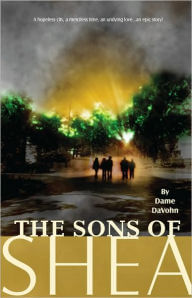Book Review: The Sons Of Shea
Book Reviewed by Robert Fleming
In Dame DaVohn’s novel of self-determination and redemption, The
Sons of Shea, the characters and plot seem ripped from the
headlines. The setting of this contemporary fictional drama is
Stonegate, Michigan, where the locals enjoyed the boom times of
the automotive industry, but now the financial bottom has fallen
out of the good lives they enjoyed. With the 1980s and 1990s,
auto plants and factories closed, and the people of this
once-stable community have seen scourge after scourge strike
their small city, known as “The Rock.” Drugs, murder, and mayhem
robbed the promise of the city.
Enter Bishop, a proud son of Stonegate, who returns to “The
Rock” after school and exposure to the outside world. His
father, a former Black Panther, schooled him on the noble role
of Black men in the survival of the community. Bishop was an
only child and when his father died of cancer during college
study, he decided to find his position in his own place. His
emotional and spiritual strength is bolstered by the early
demise of his mother when he was only four years old.
DaVohn, as an author, hammers away at the cultural nationalist
themes of renewal and redemption of a community by its people,
namely its men. It’s almost a fictional vision akin to a novel
which would have been written by a young Huey Newton or Marcus
Garvey. When Bishop rides to the rescue to his community, he
knows that nothing will be easy and that the stakes will be
high. Like the Black Panthers or the Nation of Islam, he
realizes that the frustration and hopelessness holding the
people back is very potent and caused by their confusion by
their daily doses of lies and dogma from their local ministers
and politicians. He knows these are not opponents to be taken
lightly.
Sometimes wordy and verbose, sometimes caught in a firestorm of
social and cultural ideas, DaVohn paints a picture that every
African American understands: “The quickest path to success,
which by the way meant driving a car with rims that cost more
than the average American brings home in a month, a sound system
that made the windows of homes tremble as they passed by, and
being clad in the fashion fad of the day, was to boom a little
dope, double-up your money, and boom a little more until you
were big enough to move a little weight.”
Schooled in ancestral history of our elders, the author gives the motivation for a new movement to Bishop, who then teaches his philosophy of transformation to his small band of followers. He teaches them self-love and love for the community around them.
Like the leader he is, Bishop explains: “A lot of times, love
requires us to mortgage everything we own in order to will it to
survive. Love is what drove the Panthers, the young brother and
sisters of SNCC (the Student Nonviolent Coordinating Committee),
the SCLC (the Southern Christian Leadership Conference), the
Freedom Riders, the NAACP, and so many powerful Black
organizations. The problem is that it’s not enough for the
leaders to love the people and the people to love the leaders �
somehow, we’ve got to convince the people that they are worth
loving themselves.”
And Bishop, the all-knowing sage, realizes that people who love
themselves and their community will not tolerate gangstas,
pimps, or murderers. He teaches his disciples that they must
take a people who have been beaten down, stripped, and
humiliated before the world and restore them to their rightful
selves. That was the challenge of the movement, he says, and
they clean up the run-down Woodland Park before going out
spreading their message.
The pleasure of the novel is Bishop’s maturation and evolution,
and how he deeply touches the lives of the people he meets:
Chase, Terrell, Set, Carmen, Tony, Tonya, Ella, Big Will, among
others. He doesn’t see the vitality and creativity of the youth,
especially the males, as a potential threat, but as an abundant
energy to be harnessed. There are some fine moments of intimacy
between Bishop and Ella, as they move beyond the realm of the
flesh to the soul level.
Also, it’s the narrative journey of Bishop’s founding of the
self-help group, the Sons of Shea, to his formation of the
larger mission, the New Rock Movement, which is fascinating to
follow. And even when Bishop succumbs to the dark forces in the
community, the positive principles of the movement move on to
city after city.
At the heart and soul of this bold and wise novel is a singular
understanding of the African American urban experience. DaVohn
instinctively know what connects us, what strengthens us, and
that is what makes this work worthwhile.

